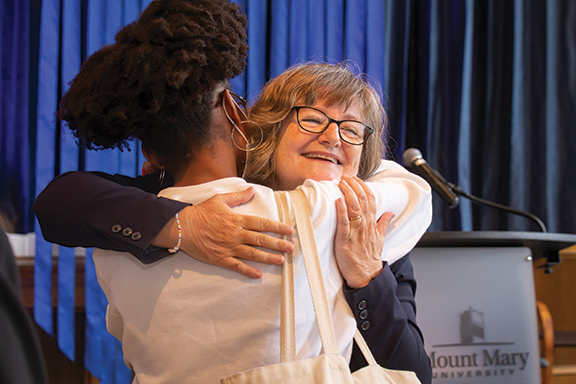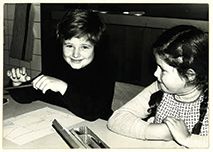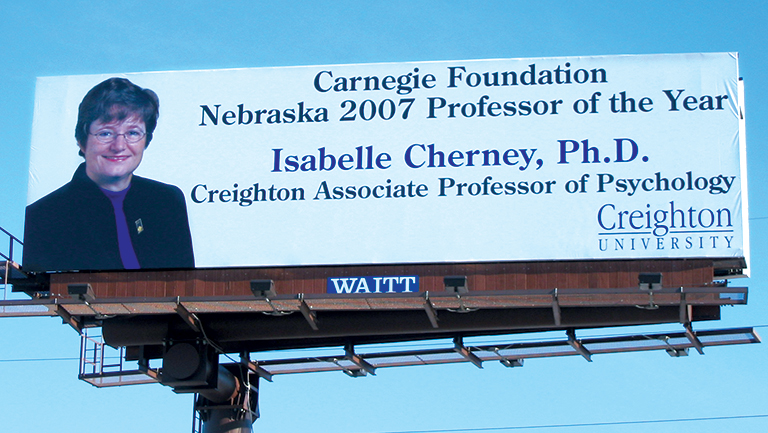President Cherney has arrived

Posted on December 7, 2022
“Whatever I’ve done has prepared me for this moment.”
Isabelle Cherney, Ph.D.
In the beginning…
formative years shape personality
As a girl growing up in Switzerland, Isabelle Cherney always got to be the teacher when she and her friends played school.
“Kids would sit and listen to what I had to say; I always had a following,” she said with a slight smile. “It was the precursor to my becoming a professor.”
Starting with her earliest memories, all of her experiences have been leading her to this moment, to this place.
Cherney, who became the 13th president of Mount Mary in July, grew up in Grenchen, Switzerland, at the foot of the Jura mountains. While this region is in a German-speaking area of the country, she, like most Swiss children, come to age within a mélange of cultures. She spoke three of the four languages of Switzerland — German, French, Italian and Romanisch — and later she learned English.

“Having been exposed to multiple cultures, languages and backgrounds, I’ve always been curious, wanting to learn about people and their pathways,” she said.
She became so fascinated with how people think that she embarked upon a career as a research psychologist, studying the connection between the mechanics of the brain and human behavior.
Yet again, her background lights her path: “Being an experimental psychologist helps to better understand one’s ability to make decisions,” she said. “As a president, it’s certainly helpful to be a psychologist.”
Starting her career…
personal experience informs research
The brain development of children has always been of particular interest, and in one of her earliest studies, she surveyed 12-year-olds from around the world regarding their opinions on children’s rights and social issues ranging from voting rights to health care access.
Their answers, she said, were incredible. The children were able to discern which rights they were able to fulfill and which ones they were not old enough to do. It was interesting to see that children from different continents had similar views.
Some years later as she dug deeper into the field of child development, she stumbled onto the topic of gender research, sparked in part by her own real-world role as a wife to Mike, and as the mother of two sons, Sebastien and Raphael.
She remembers how it happened, the result of an everyday, common occurrence. “They’d always ask me, ‘where’s my school stuff?’” she recalled.
“Even though I didn’t move it, I always seemed to know
where it was.”
This skill is called incidental memory, she explained, the ability to recall information that isn’t directly pertinent, information that one did not actively work to remember.
It turns out that gender plays a slight role in one’s powers for incidental memory, depending on what it is that needs to be recalled.
It made her wonder if gender played a role in one’s capacity for different types of memory, not only incidental memory, but also spatial memory, the ability to visualize and rotate shapes in three dimensions.
“Men have better spatial memories than women; they understand the world in 3-D,” she said. “I started to wonder, what did they learn early in life that made
them good at this?”
Girls often score poorly when tested on their spatial ability, and Cherney needed to know why. As she dug deeper, she uncovered the long-term impact of this disparity.
The implications of this type of visual capability go far beyond a person’s ability to pack the trunk for a car trip or win a game of Tetris. They affect one’s choices with life-changing significance.

“If women do not develop spatial reasoning or are not exposed to math and geometry, women can be at a disadvantage – entrance tests for medical and dental fields, for example – and they may be dissuaded from entering fields such as computer science, physics or engineering.”
Her conclusion: In order for girls to wire their brains for spatial reasoning, they need to be provided with similar kinds of play options to boys, from sports to 3-D video games.
She has researched and published extensively on this topic for almost 20 years, primarily at Creighton University in Omaha, Neb. After having served as associate dean of the graduate school and school of professional studies, Cherney left Creighton in 2016 to work at Merrimack College in North Andover, Mass., where she continued her research while assuming even greater administrative authority, founding a number of programs for new teachers and ultimately being named vice provost for graduate education and research.
All the while she continued to conduct research around the topics of how gender and child development influence career pathways. Her most recent piece of research, titled, “The STEM Paradox: Factors Affecting Diversity in STEM Fields,” will be published in 2023. Because of her area of expertise, she was invited by the Obama administration to the White House on four separate occasions.
Mount Mary is taking women’s brains and giving them the potential to change their trajectory in powerful ways.”
Mount Mary President Isabelle Cherney, Ph.D.
Today as president of an all-women’s institution, she is in a place where
her knowledge can be applied in ways that are truly transformational.
She foresees growing implementation of STREAM (Science, Technology, Reflection, Engineering, Arts and Math) practices in every corner of campus.
“Here, we have the ability to digitally expose students to what we know really works,” she said. “I see MMU women as STREAM women, with virtual reality and computer modeling software in every major, exposing them to coding opportunities that allow them to see the world in a digital way.
“Mount Mary is taking women’s brains and giving them the potential to change their trajectory in powerful ways.”
Her journey continues…
returning to a special place
Time and again, the interplay between her personal and professional life has led Cherney closer to Mount Mary, sometimes without even knowing it.
In 1984, Cherney flew from Europe to the U.S. for the first time with then fiancée, Mike, to spend Christmas with his family. She met his parents, siblings and notably his sister Claudia, and Claudia’s family of nine children. Claudia graduated from Mount Mary in 1961 with a degree in chemistry.
They gathered at the family home in Milwaukee, located five houses across the street from Mount Mary.
“I’d heard so many stories about Christ King, where Mike went to grade school, and the School Sisters of Notre Dame,” she said.
Even though Mike was working on his Ph.D. in physics in Hamburg, Germany, he was closely connected to his family and his Catholic faith.
“The SSNDs were part of the family, an extension of the Cherneys,” she recalled. Often, she recalled that Claudia would cook in batches big enough to feed her family of 11, and give a meal to the SSNDs, too.
“My husband’s family introduced me to a new dimension of devotion,” she said.
Earlier that year, Isabelle had met Mike at a party in Geneva, Switzerland, and instantly fell in love. Within three weeks they were engaged and figuring out the logistics of a long-distance relationship.
After they wed, Mike would travel 13 hours each way in a weekend from his work in Hamburg to Isabelle in Geneva.
They often visited Mike’s family in Milwaukee, particularly after Claudia’s death in 1988.
“The funeral at Christ King was packed,” she said. “It was then that I understood how one person could make a difference.”
Isabelle plans to establish an endowed scholarship at Mount Mary in honor of her late sister-in-law.
It is particularly poignant that 35 years after Claudia’s death, Isabelle’s inauguration will be held at the family’s beloved church.
When Mike got a professorship at Creighton University in Omaha, Neb., the family settled in the U.S. Isabelle joined the faculty at Creighton after completing her B.A., M.A., and Ph.D. while raising her sons. Today, Isabelle
maintains dual citizenship with the U.S. and Switzerland.
Her world came into crystal focus in 2021, when she learned Mount Mary was searching for a new president. “
It was unreal, that feeling of how everything I’ve done was for this moment.”
Arriving at MMU…
new beginnings and coming full circle
Cherney has spent her first few months getting to know the institution and its people.
“I feel I have the essence of the soul of the place, and that I’m able to confidently tell Mount Mary’s stories, our important work and influence on the community,” she said.
She has crafted the theme for her inaugural year with this impact in mind: “One Community Shaping Tomorrow’s Game-Changers.”
She has found her home like nowhere else in the world. One of Claudia’s children lives only four houses away from hers. Isabelle’s sons and their families live in the greater Chicago area, allowing her to be close to her three grandchildren. Her work at Mount Mary allows her to put in practice the discoveries of her research.
In this place, in her roles as a leader, an academic and a woman of faith, the threads of Cherney’s life are woven tightly together.
“It is such a privilege to serve in the name of this school, in the name of the SSNDs,” she said. “This was meant to be.”



